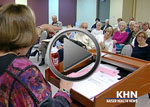Three weeks after suffering a heart attack, Bernie Hollander came to a recent meeting at Leisure World in Silver Spring with his wife, Rose, to learn about the Medicare drug plans being offered next year.
“I’m a heart patient, I’m a diabetic – I have a lot of problems,” said Hollander, 81, who lives in the retirement community. But getting the expensive medications he needs isn’t one of them.
He was at the meeting to get updated advice from Leta Blank, head of the Montgomery County Senior Health Insurance Assistance Program. SHIP, as it is commonly known, helped him sort through dozens of insurance policies last year to find one that would cover the eight drugs he takes. His medications cost $14,000 through the end of September, and his share of the bill was $5,000.
“The SHIP program tells you basically what is your best value for your dollar,” he said.
Medicare Drug Plans in 2012
See more on Medicare’s 2012 Part D plans:
Funded by the federal Older Americans Act and local jurisdictions, SHIPs help people navigate Medicare, the federal health-care program that serves 46.5 million older or disabled Americans. There is a SHIP in nearly every county, providing advice over the phone, in person and at public meetings. Some SHIP counselors even make house calls.
This is their busy season: The annual open enrollment period for Medicare drug plans – also known as Part D plans – began last month and runs until Dec. 7. Although drug coverage is optional, millions of Medicare beneficiaries enroll in a plan, and choosing the right one can be tricky.
They can also get advice about Medicare Advantage managed care policies, which are also open for enrollment now, and offer medical coverage within a network of health care providers along with, in many cases, drug coverage.
Drug coverage is optional for Medicare beneficiaries. But seniors who want it must search dozens of policies covering different drugs from different pharmacies at different prices. For 2012, there are 30 drug plans offered in Virginia and 31 in Maryland and the District. Insurers can modify benefits and pricing from one year to the next. And drug prices can change as often as every four weeks. SHIP counselors can help untangle the details.
Surveys have shown that once seniors choose a drug plan, most stay in it even if there are cheaper alternatives as years go by. But they would be smart to take a fresh look every autumn: In a study presented in October, researchers examined the plans used by about 270 California seniors and found that three-quarters of them would save an average of $450 if they changed plans in 2011.
“Never, ever assume that if your drugs are covered this year they will be covered next year,” said John Glowacky of the Arlington office of the Virginia Insurance Counseling and Assistance Program, which is part of SHIP. “And just because you have a no-deductible plan now, there’s no guarantee that it will remain a no-deductible plan.”
In the District and Maryland, premiums for six of the top 10 drug plans will rise in 2012 by as much as 16 percent, according to an analysis for Kaiser Health News by Avalere Health, an independent research firm. In Virginia, premiums for half of the 10 plans with the highest enrollment are going up by as much as 17 percent next year.
To help find the best buy, SHIP counselors use the online “plan finder” at the top of Medicare’s website. Users enter their Zip code and the names of the drugs they are taking, plus other information. The website then produces a list of plans covering those drugs at nearby pharmacies and their estimated annual cost. (Before choosing a plan, SHIP counselors recommend calling the insurer to verify the information.)
At the District’s SHIP – the Health Insurance Counseling Project at the George Washington University Law School – seven law students, backed by their professor Suzanne Jackson, handle some of the tougher cases. Seniors can also get help from another lawyer, a program director and community volunteers. Counselors make regular visits to senior centers across the city. Last year they held more than 70 Medicare meetings and helped nearly 3,000 people individually.
In Fairfax County, SHIP manager Howard Houghton trains volunteers to help beneficiaries shop for coverage, speaks at senior centers and records podcasts for the county’s Web site.
“Like Johnny Appleseed,” he says, he crisscrosses his territory to reach as many of the county’s 113,000 Medicare beneficiaries as possible.
Even though the Medicare drug benefit took effect five years ago, some area seniors still don’t use it. Robert Townes, 77, of Arlington, couldn’t afford the medicine to treat his high blood pressure and other health problems and would often skip doses or cut pills in half because they cost $700 a month.
In September, Glowacky – from the Virginia SHIP program – helped Townes enroll in a Medicare prescription drug policy and get a federal government subsidy to pay for coverage. Now he pays $50 a year for drugs that come in the mail every three months.
“I feel like a different person,” he said. “I’m doing pretty good for an old man.”







